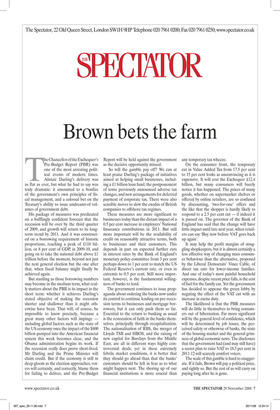Brown bets the farm
The Chancellor of the Exchequer’s Pre-Budget Report (PBR) was one of the most arresting political events of modern times. Alistair Darling’s delivery was as flat as ever, but what he had to say was truly dramatic: it amounted to a bonfire of the government’s own principles of fiscal management, and a colossal bet on the Treasury’s ability to issue undreamt-of volumes of government debt.
His package of measures was predicated on a bafflingly confident forecast that the recession will be over by the third quarter of 2009, and growth will return to its longterm trend by 2011. And it was constructed on a borrowing requirement of historic proportions, reaching a peak of £118 billion, or 8 per cent of GDP, in 2009-10, and going on to take the national debt above £1 trillion before the moment, beyond not just the next general election but the one after that, when fiscal balance might finally be achieved again.
But startling as those borrowing numbers may become in the medium term, what really matters about the PBR is its impact in the short term: whether it achieves Darling’s stated objective of making the recession shorter and shallower than it might otherwise have been. That will, of course, be impossible to know precisely, because a great many other factors will impinge — including global factors such as the state of the US economy once the impact of the $800 billion pumped into the American financial system this week becomes clear, and the Obama administration begins its work. If the recession really does prove short-lived, Mr Darling and the Prime Minister will claim credit. But if the economy is still in deep gloom as the election approaches, voters will certainly, and correctly, blame them for failing to deliver, and the Pre-Budget Report will be held against the government as the decisive opportunity missed.
So will the gamble pay off? We can at least praise Darling’s package of initiatives aimed at helping small businesses, including a £1 billion loan fund, the postponement of some previously announced adverse tax changes, and new arrangements for deferred payment of corporate tax. There were also sensible moves to slow the exodus of British companies to offshore tax regimes.
These measures are more significant to businesses today than the distant impact of a 0.5 per cent increase in employers’ National Insurance contributions in 2011. But still more important will be the availability of credit on reasonably attractive terms, both to businesses and their customers. This depends in part on expected further cuts in interest rates by the Bank of England’s monetary policy committee from 3 per cent perhaps down to 1 per cent to match the US Federal Reserve’s current rate, or even in extremis to 0.5 per cent. Still more important, however, is the fundamental willingness of banks to lend.
The government continues to issue propaganda about ordering the banks now under its control to continue lending on pre-recession terms to businesses and mortgage borrowers, but it can only push them so far. Essential to the return to banking as usual is the restoration of faith in the banks themselves, principally through recapitalisation. The nationalisation of RBS, the merger of Lloyds TSB and HBOS, and the raising of new capital for Barclays from the Middle East, are all in different ways highly controversial deals; yet in these extremely febrile market conditions, it is better that they should go ahead than that the banks’ customers should be left in fear as to what might happen next. The shoring up of our financial institutions is more crucial than any temporary tax wheeze.
On the consumer front, the temporary cut in Value Added Tax from 17.5 per cent to 15 per cent looks as unconvincing as it is expensive. It will cost the Exchequer £12.4 billion, but many consumers will barely notice it has happened. The prices of many goods, whether on supermarket shelves or offered by online retailers, are so confused by discounting, ‘two-for-one’ offers and the like that the shopper is hardly likely to respond to a 2.5 per cent cut — if indeed it is passed on. The governor of the Bank of England has said that the change will have little impact until late next year, when retailers can say ‘Buy now before VAT goes back up again’.
It may help the profit margins of struggling shopkeepers, but it is almost certainly a less effective way of changing mass consumer behaviour than the alternative, proposed by the Liberal Democrats’ Vince Cable, of direct tax cuts for lower-income families. And one of today’s most painful household expenses, despite recent price falls, is the cost of fuel for the family car. Yet the government has decided to appease the green lobby by negating the effect of the VAT cut with an increase in excise duty.
The likelihood is that the PBR measures will do little in themselves to bring consumers out of hibernation. Far more significant will be the general level of confidence, which will be determined by job losses, the perceived safety or otherwise of banks, the state of the housing market and the general grimness of global economic news. The disclosure that the government had (and may still have) a secret plan to raise VAT to 18.5 per cent in 2011-12 will scarcely comfort voters.
The scale of this gamble is hard to exaggerate. If it fails, Brown will pay a political price, and rightly so. But the rest of us will carry on paying long after he is gone.


































































































 Previous page
Previous page